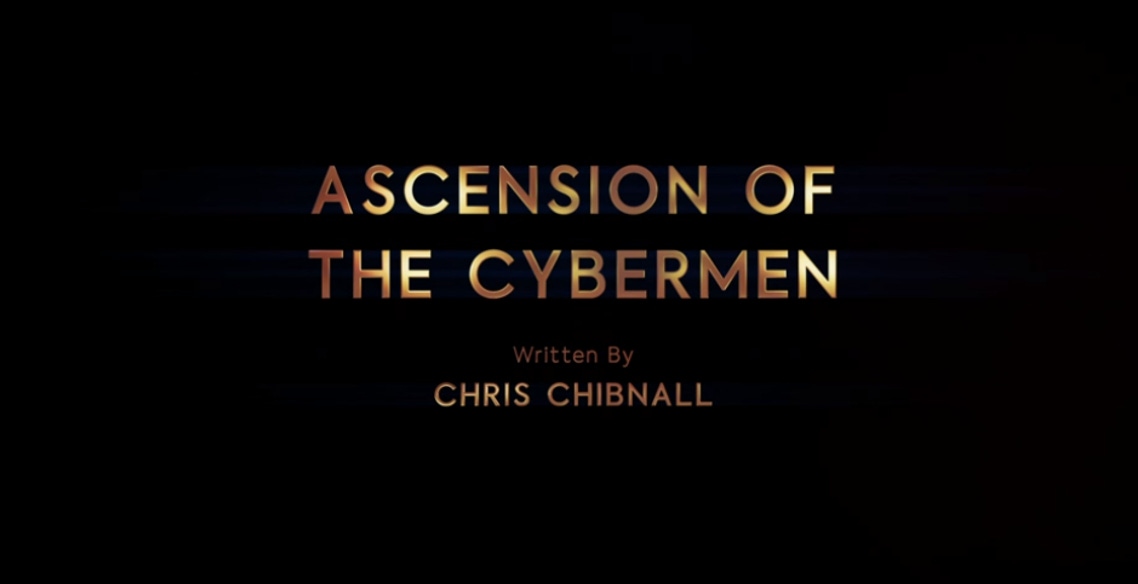
Doctor Who
“Ascension of the Cybermen”
Series 12, Episode 9
Written by Chris Chibnall
Directed by Jamie Magnus Stone
Starring Jodie Whittaker, Tosin Cole, Mandip Gill, and Bradley Walsh
Guest Starring Alex Austin, Caolan Byrne, Matt Carver, Rhiannon Clements, Branwell Donaghey, Julie Graham, Evan McCabe, Ian McElhinney, Patrick O’Kane, Orla O’Rourke, and Sacha Dhawan
49 minutes
Original broadcast 23 February 2020
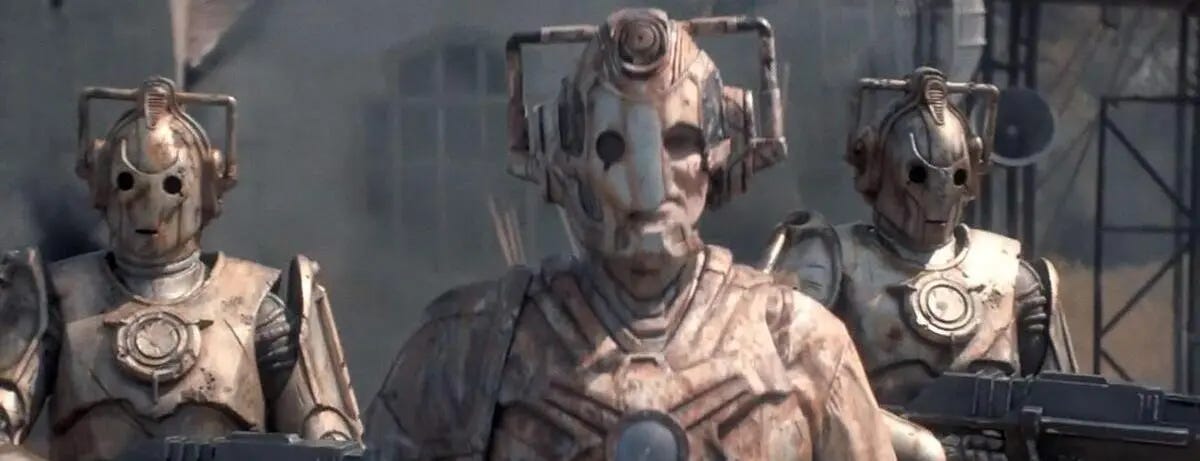
1. Beginning of the End
Doctor Who, during its five-plus decades on the air, has amassed the reputation of a program that offers optimistic visions of the past, the present, and the future. No matter where the Doctor ventures in space or time, she (or he) tries always to maintain senses of wonder, joy, and fairness throughout the universe; tries always to help people—human or otherwise—in distress; and tries always to embrace the power that kindness, compassion, and love can wield in the face of disaster, which so frequently arises during the Doctor’s madcap voyages throughout the time vortex that catastrophe is now as familiar to the faithful Who viewer an old friend’s personality.
Doctor Who’s informal mission statement—about offering hope no matter the danger—is often best voiced during the Doctor’s final speech before regenerating into a new incarnation, with the Twelfth Doctor (Peter Capaldi) giving his successor this terrific advice during his stirring address at the conclusion of “Twice Upon a Time,” New Who’s 2017 Christmas Day Special: “Basic stuff first: Never be cruel, never be cowardly, and never ever eat pears! Remember, hate is always foolish, and love is always wise. Always try to be nice, but never fail to be kind.” And then, with Murray Gold’s music rising to magnificent crescendos, Twelve says, in tear-jerking moments wonderfully scripted by then-showrunner Steven Moffat and beautifully delivered by Capaldi, “Laugh hard. Run Fast. Be kind. Doctor, I let you go.”
When Jodie Whittaker’s Thirteenth Doctor appears moments later, she utters the words “Oh, brilliant!” not merely in response to the Doctor becoming a woman (for the first time in series history, if not for the first time in the Doctor’s history) but also to Twelve’s insistence that, no matter how dire the peril Thirteen’s voyages will entail, she must keep kindness foremost in both her Gallifreyan hearts.
This lovely lesson is one that Classic Who and New Who have always taught and that the Thirteenth Doctor, in Whittaker’s splendid portrayal, has been especially good at fulfilling. Whittaker, ever since her introduction in “Twice Upon a Time,” has played Thirteen as an elfin, exuberant, and entertaining journeywoman who habitually rectifies injustice whenever she encounters it, as demonstrated throughout her inaugural adventure, Series 11’s “The Woman Who Fell to Earth.”
When the human residents of Sheffield, England fall under threat by Stenza warrior T’zim-Sha’s (Samuel Oatley’s) ritual hunt, the Doctor opposes his willingness to kill people merely for the sake of sport. And when T’zim-Sha asks, “Who are you?” at this episode’s climax, Thirteen’s response is among my favorite bits of Doctor dialogue in franchise history: “Bit of adrenaline, dash of outrage, and a hint of panic knitted my brain back together. I know exactly who I am. I’m the Doctor, sorting out fair play throughout the universe. Now please, get off this planet while you still have a choice.”
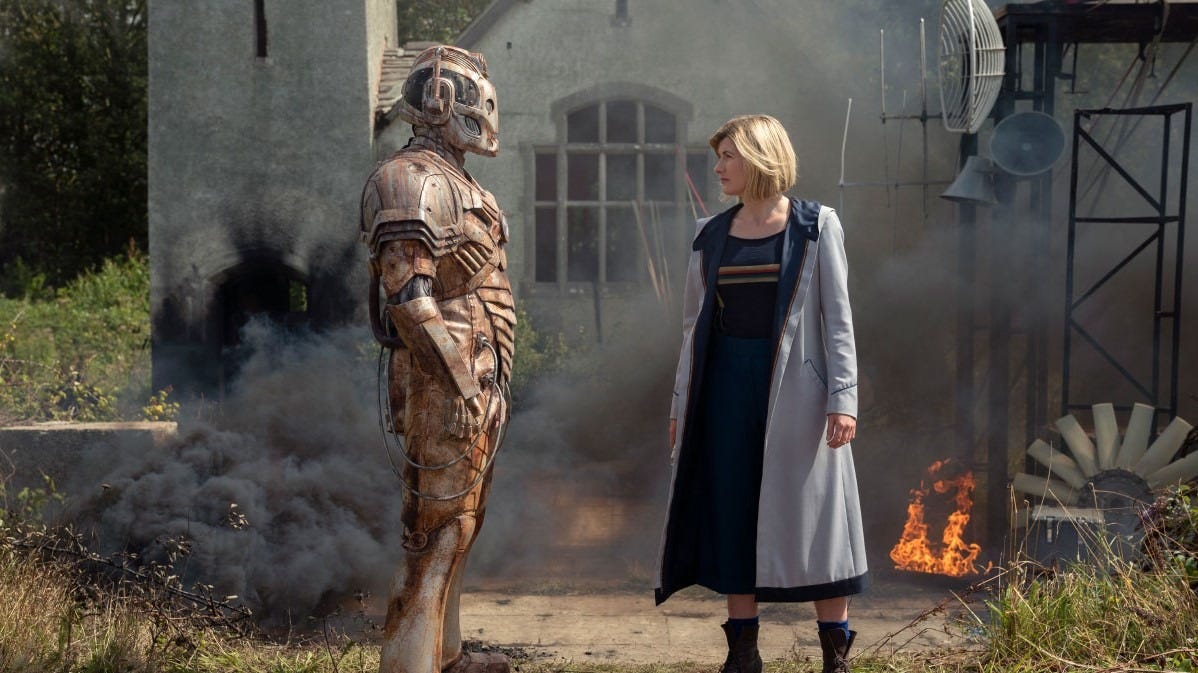
As my review of “The Woman Who Fell to Earth” documents, Whittaker’s confident utterance of these lines brought me whooping out of my armchair, clapping aloud as if I were inside a playhouse or a movie theatre. To this day, I feel no shame in confessing that “The Woman Who Fell to Earth” enthused me enough to forget that I was at home, by myself, while watching it. And as I’ve stated many times in my appraisals of Series 11 and Series 12, Whittaker’s tenure as the Doctor has been a smashing success, so, yes, I’ll be sad when she departs the role in New Who’s BBC Centenary Special, set to air sometime in Autumn (probably October or November) 2022.
Despite the Doctor’s loving attitude toward life, the franchise regularly traffics in danger, horror, terror, and the possibility of universal destruction, indeed so often throughout its 59-year existence that newcomers may wonder just how Doctor Who has perpetuated itself for so long without going narratively stale. As a venture in longform storytelling, Who at its worst lapses into dreary formula, but, at its best, refreshes old characters, plots, themes, and tropes—including its own clichés—into drama so fizzling that committed fans stay tuned to see not only what happens next but also how Who’s creators will make what happens next exciting and new.
Devising memorable antagonists in the form of human and extraterrestrial adversaries for the Doctor to confront has become a franchise specialty so wide in scope and so deep in detail that the many aliens, critters, and monsters that the Doctor has encountered since 23 November 1963 are too plentiful to enumerate here. Whole websites chronicle each and every one of these beings, but these creatures’ willingness to do harm to the cosmos doesn’t make the Doctor’s (or Doctor Who’s) native optimism the naïve optimism of hayseed apple-cart riders getting their first glance of the universe’s complexity. No, this positivity is, instead, a brave determination to remain cheerful even in the face of unremitting evil.
And few of the Doctor’s nemeses are as implacable as the Cybermen (introduced to Who in the 1966 First Doctor serial The Tenth Planet) or as difficult to defeat as Ashad (Patrick O’Kane), the Lone Cyberman that John Barrowman’s Captain Jack Harkness warned Team TARDIS to avoid in Series 12’s fifth installment (“Fugitive of the Judoon”). Ashad appeared, in the metal-encased flesh, in Series 12’s eighth entry (“The Haunting of Villa Diodati”), where the Doctor, lest we forget, was forced to let him escape with the Cyberium (an artificial-intelligence database holding all knowledge about the Cybermen throughout time) to prevent irrevocably altering Earth’s history. Yet, as Series 12’s ninth outing—the ominously titled “Ascension of the Cybermen”—begins, both the Doctor and her companions realize just how precipitous this decision was.
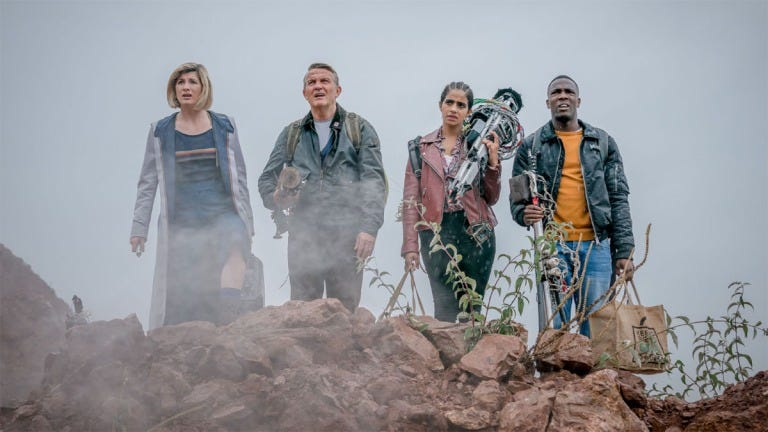
2. No Place to Hide
To pronounce as calamitous the situation that Thirteen, Ryan Sinclair (Tosin Cole), Yasmin “Yaz” Khan (Mandip Gill), and Graham O’Brien (Bradley Walsh) encounter in this installment’s opening moments vastly understates the matter. They take the TARDIS to temporal and spatial coordinates provided, at “Villa Diodati’s” conclusion, by Romantic poet Percy Bysshe Shelley (Lewis Rainer), only to find a group of seven human beings in the distant future scavenging for survival on an unnamed refugee planet. The so-called Cyber Wars have left this single settlement as humanity’s only remaining outpost and its seven inhabitants as the sole remnants of our species, whose annihilation the remaining Cybermen—weakened and nearly destroyed, but still stronger than their human targets—wish to complete.
This premise reasserts writer and showrunner Chris Chibnall’s fondness for tales of near-apocalypse, paralleling events and themes from “The Battle of Ranskoor Av Kolos,” the good-but-not-great Series 11 finale in which Team TARDIS finds a ragtag group of human beings fighting for their lives on the debris-and-corpse-strewn battlefields of the titular planet, which has become an immense wasteland.
This time, however, rather than introducing two new (or relatively new) species to the mix—the Ux and the Stenza (in the form of warrior T’zim-Sha, who survives his defeat by the Doctor in “The Woman Who Fell to Earth” to conscript the Ux’s telekinetic powers for his own ends in “Ranskoor Av Kolos”)—Chibnall resurrects one of the Doctor’s oldest, strongest, and cruelest enemies: the Cybermen. Having already included the Daleks and the Master in previous Series 11 and 12 episodes, Chibnall transforms these emotionless, “upgraded” cybernetic antagonists into one of the last remaining species in New Who’s universe, the Cyber Wars having reduced the cosmos to rubble during battles that bring humanity and Cybermen to the abyss of extinction.
Matters don’t improve when Team TARDIS sets up equipment to protect the settlement from an imminent attack led by Ashad, who arrives in two Cyberfighters that unleash a swarm of Cyberdrones—nine flying Cyber heads shooting laser bolts from their eye sockets!—that quickly destroys these defenses and kills three people. This rout sends everyone scrambling, with Graham and Yaz escaping in a “gravraft” with refugees Ravio (Julie Graham), Bescot (Rhiannon Clements), and Yedlarmi (Alex Austin) while the Doctor, Ryan, and refugee Ethan (Matt Carver)—cut off from the TARDIS—steal one of the two Cyberfighters thanks to the Doctor’s quick thinking and Ethan’s talent at hotwiring Cyber technology.
This sequence is an exciting, if distressing sight to behold thanks to Jamie Magnus Stone’s commitment to matching the sheer ferocity of Chibnall’s script, whose furious tempo slows only to permit necessary dialogue. The way Ashad relentlessly hunts down every human survivor surprises even the Doctor in its mercilessness, causing her to bark commands at her companions without worrying about their feelings.
She also appears horrified by the attack’s swift precision in cutaway shots that drive home just how uncompromising Ashad’s assault is. The entire cast is excellent, with Tosin Cole, Mandip Gill, and Bradley Walsh selling each companion’s fear and distress so well that I worried one or more might not make it out alive. The stunt team exceeds its work in Series 12’s two-part “Spyfall” premiere, while Rebecca Trotman’s superb editing and Segun Akinola’s score ramp up the adrenaline, suspense, and pressure to almost unbearable levels.
Even so, Chibnall chooses to alternate these scenes of destruction with the story of a lad named Brendan (Evan McCabe), who, while still an infant, is discovered by a man named Patrick (Branwell Donaghey) lying inside a baby basket abandoned on an empty road near an unnamed Irish village sometime in the early or mid-twentieth century. Patrick and his wife, Meg (Orla O’Rourke), inform the police about this foundling, but later adopt Brendan, whom we see become a toddler, then a youngster, then a teenager in a montage that relates his happy life in appropriately jaunty fashion. Brendan decides to join the local constabulary, but, one day, after cornering a thief near an ocean cliffside on his village’s outskirts, the robber pulls a pistol and shoots Brendan in the chest, who then tumbles off the precipice to the beach below.
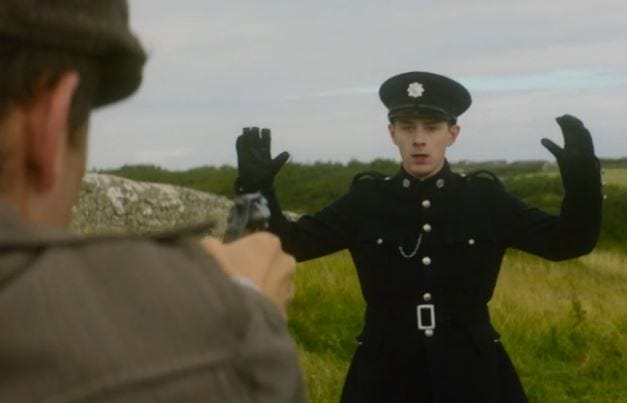
Anyone familiar with Chibnall’s excellent, 2013-2017 ITV crime drama Broadchurch (or its American adaptation, Fox TV’s Gracepoint) recognizes this imagery as replaying significant moments from Broadchurch’s premiere episode, in which 11-year-old Danny Latimer (Oskar McNamara) falls from the cliffs of Broadchurch, a seaside community in Dorset, to the beach below, triggering a police investigation headed by Detective Inspector Alec Hardy, played by the Tenth Doctor himself, David Tennant.
Broadchurch is packed with New Who alumni, including Arthur Darvill (who played companion Rory Williams to Matt Smith’s Eleventh Doctor during Series 5, 6, and 7), Olivia Colman (who played the guest character “Patient Zero” in Series 5’s premiere episode, “The Eleventh Hour”), and, yes, Jodie Whittaker as Beth Latimer, the murdered boy’s mother.
Chibnall’s happy experience working with Whittaker on Broadchurch’s three seasons led him to cast her as the Thirteenth Doctor, so including Brendan’s story in “Ascension of the Cybermen” strikes all sorts of intertextual chords despite its pastoral imagery clashing with the refugee planet’s blasted landscapes, as well as the blue-hued technological coldness of the Cyberfighters and, especially, the Cybercarrier that Yaz, Graham, Ravio, Bescot, and Yedlarmi commandeer after encountering it in deep space. Even more perplexing is how Brendan’s tale connects to this episode’s plot of far-future humanity on the brink of extinction, until, that is, Brendan—who, don’t forget, plummeted hundreds of feet to the beach after getting shot in the chest—sits up, alive and well and unharmed.
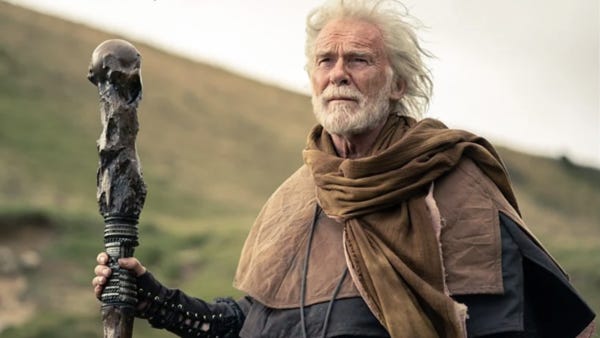
3. End of the Beginning
This unbelievable development leads discerning viewers to suspect that Brendan’s scenes stand in for someone else’s story, perhaps even the Doctor’s—or, at least, a Time Lord’s—since Brendan survives impossible wounds. He doesn’t regenerate, but instead carries on with his life, just as Team TARDIS and the refugees must carry on with theirs. Yaz’s and Graham’s group decides to take the Cybercarrier to the planet Ko Sharmus, which they’ve heard houses something called “the Boundary,” described by Ravio as “supposedly a way out of this galaxy. A gateway, a direct route out of here, into another random part of the universe” that, with luck, will protect them from future contact with the Cybermen.
Yet the Doctor, Ryan, and Ethan arrive on this planet before them to discover, A) another rundown encampment and, B) that the planet is not called Ko Sharmus, but that this label is, in fact, the name of the settlement’s lone resident, the grizzled Ko Sharmus (Ian McElhinney), veteran of the Cyber Wars and lonely sentry for the Boundary, a vortex that opens when any person steps close enough to it. Sharmus tells the Doctor, Ryan, and Ethan that many people fleeing the Cybermen have crossed the Boundary to somewhere else, he knows not where. Sharmus has remained behind to guide human survivors to the vortex and safer harbors, wherever they may be.
Chibnall and casting director Andy Pryor continue their Series 12 winning streak by hiring Ian McElhinney as Ko Sharmus, allowing the man to etch the memorable portrait of a battle-hardened warrior so weary of fighting that compassion is all that keeps him going. McElhinney, one of Belfast, Northern Ireland’s best actors, began his stage career in the late 1970s before transitioning to television and film during the early 1980s. He’s perhaps best known to American audiences for playing Ser Barristan Selmy in 25 episodes of David Benioff’s and D.B. Weiss’s 2011-2019 HBO adaptation of George R.R. Martin’s novel Game of Thrones.
Star Wars fans know McElhinney for inheriting the role of General Jan Dodonna (from Alex McCrindle, who originated this part in 1977’s Star Wars—now, officially, Star Wars: Episode IV: A New Hope—but who died in 1990) in Gareth Edwards’s 2015 standalone movie Rogue One: A Star Wars Story. McElhinney, in another intersection with the Who franchise, appeared in two episodes of Russell T. Davies’s groundbreaking 1999-2000 ITV drama Queer as Folk (playing the reserved father of Aidan Gillen’s proudly gay Stuart Alan Jones).
McElhinney’s masterful work as Ko Sharmus helps divert attention from three surprises that Chibnall’s teleplay hides in its final 15 pages (and that “Ascension of the Cybermen” blasts through during its final 15 minutes). First, Ashad boards the Cybercarrier and seems to torture some of its (thousands of) Cyberwarriors to prepare for the ascension promised by this episode’s title, which, in Ashad’s vague description, involves his quasi-religious quest to utilize the Cyberium to achieve a higher state of perfection that will inevitably make the Cybermen the universe’s dominant force.
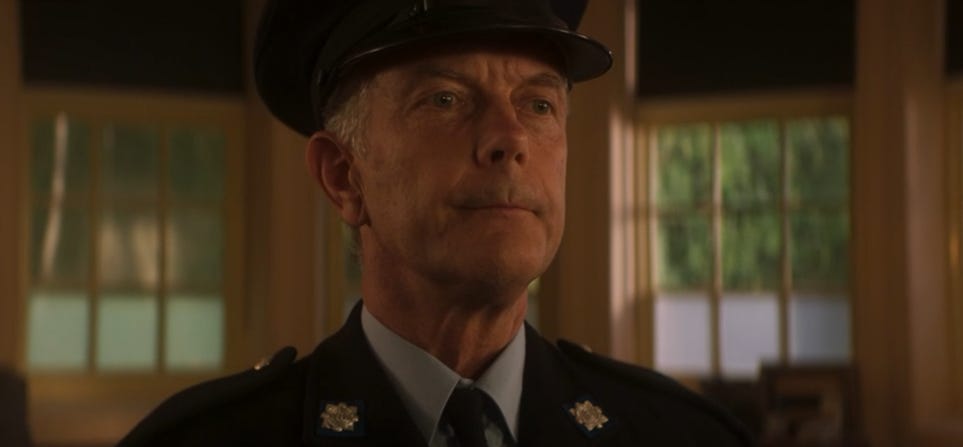
Second, Brendan’s story sees him become an older man in his sixties who, upon retiring from the police force, is given a ticking clock as a gift for his decades of service before being escorted by his adoptive father, Patrick, and the unnamed Sergeant (Caolan Byrne) who recruited him—both of whom haven’t aged a day—into a back office, where they handcuff Brendan to a chair and attach electronic leads to his head. Both men are apologetic when telling Brendan that they must get rid of everything, meaning that they must wipe his memories.
After the Sergeant activates the machine attached to these leads, Brendan screams in misery at what resembles electroshock therapy, but what eagle-eyed viewers recognize as agony that mimics the terrible sight of the Tenth Doctor’s (David Tennant’s) distress when, in Series 3’s “Human Nature,” he uses the TARDIS’s Chameleon Arch to erase his identity as a Time Lord and become fully human.
This connection, along with that ticking clock, recalls “Fugitive of the Judoon” to suggest that Brendan’s scenes aren’t accidental interpolations into the end-of-the-universe / end-of-time storyline that “Ascension of the Cybermen” dramatizes, but rather that they form a shadow narrative implying Jo Martin’s Fugitive Doctor to be an earlier version of the Thirteenth Doctor, whose memories of her time as the Fugitive incarnation were, at some point in the past, expunged.
“By whom and for what purpose?,” we naturally ask. As “Ascension of the Cybermen’s” running time winds down, we can only hope that this dual installment’s second half will provide the answers. Chibnall virtually guarantees this outcome when Thirteen steps close enough to activate the Boundary’s vortex, through which she sees her home planet of Gallifrey on the other side.
Yet this Gallifrey is abandoned, at least judging by how the capital city’s massive Citadel of the Time Lords—one of New Who’s most potent recurring images, seen throughout the Russell T. Davies and Steven Moffat eras—is shattered to bits. Gallifrey, pristine and alive and full of people, was last visited by Peter Capaldi’s Twelfth Doctor in Series 9’s two-part finale (“Heaven Sent” / “Hell Bent”), but now the planet appears demolished. Then, on cue, Sacha Dhawan’s unhinged Master leaps through the vortex to fulfill the prediction promised by his declaration at the end of “Spyfall: Part One” (“Everything that you think you know is a lie!”) by making, if possible, an even more troubling pledge: “Be afraid, Doctor, because everything is about to change . . . forever.”
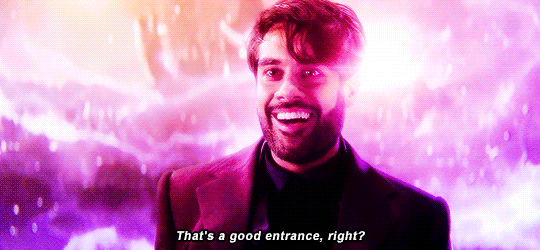
So, my friends, Chibnall draws together themes, symbols, hints, murmurings, story arcs, and entire plotlines that he and his writing staff braid throughout Series 12 (and, given the next installment’s title of “The Timeless Children,” Series 11 too). The pace of “Ascension of the Cybermen” is so brisk that some details may, at first blush, escape the viewer’s notice, but they remain laced into a tapestry woven tightly enough to make this occasionally perplexing, yet always breathless entry a satisfying culmination of Series 12’s most significant developments that nicely tees up its successor. Plus, the conveniences of Chibnall’s plotting, especially the Master crossing the Boundary at the right moment to guarantee maximum drama, are forgivable considering the short-term jolts and long-term implications they provide.
Chibnall’s detractors won’t accept this judgment or the observation that Doctor Who has always depended upon wild coincidences, but I appreciate Chibnall’s zany, chaotic, and absurd sense of drama here. “Ascension of the Cybermen,” like so many of New Who’s best outings, threatens to fly apart at the seams, yet maintains equilibrium just long enough for the cast to play moments of fear, relief, and pathos astoundingly well considering the fever pitch at which events unfold. Patrick O’Kane again deserves praise for making Ashad a formidable antagonist, but top marks go, as always, to Whittaker, Cole, Gill, and Walsh for making Team TARDIS the best group of mates one could hope to encounter anywhere in the universe.
So, yes, friends, as must be clear, I enjoyed “Ascension of the Cybermen” as a grand adventure across space and time that’s not afraid of dipping into melancholy or, when necessary, outright anguish. This entry excites me enough to look forward to Series 12’s final episode with enthusiasm, so I hope (and trust) it will do the same for you.





